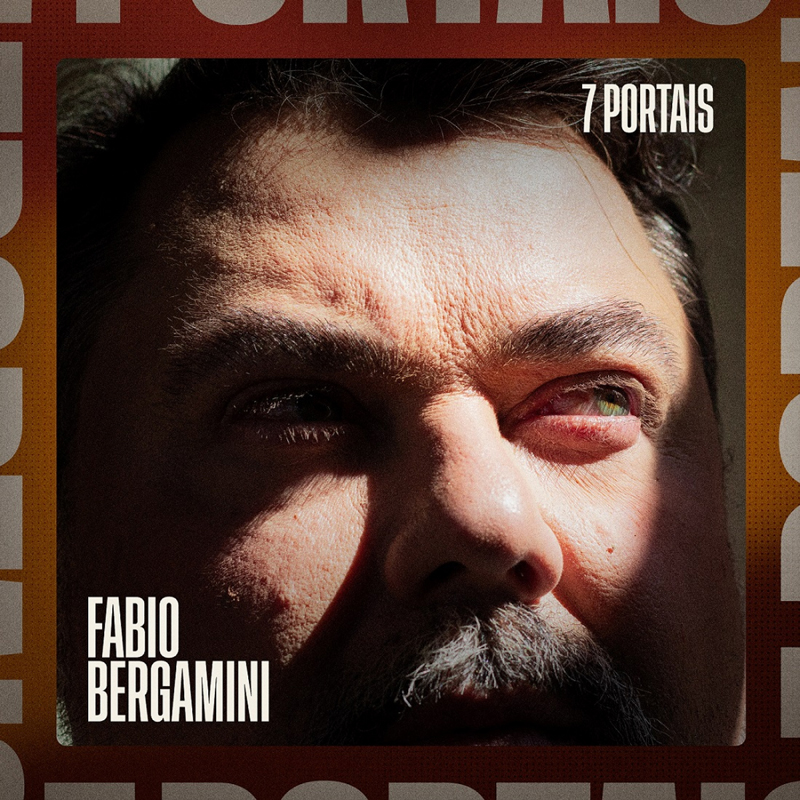Fabio Bergamini – 7 Portais (Belic Music, 2024)
Fabio Bergamini’s 7 Portais is a captivating exploration of global percussion traditions. Indeed, he expertly combines ancient rhythms with contemporary innovation. The album features collaborations with 22 artists from diverse cultural backgrounds and countries, including India, South Africa, Mozambique, Japan, Angola, and Portugal.
Notably, 7 Portais invites listeners on a journey inspired by nature, the cycles of life, and humanity’s shared heartbeat. Although it was initially conceived as a solo percussion project, 7 Portais evolved into a collective effort, presenting various traditional instruments such as the mbira, balafon, berimbau, and timbilas. Meanwhile, Bergamini uses the mesmerizing handpan, a relatively new instrument, extensively.
Vocalists like Lenna Bahulle (Mozambique), Paula Mirhan (Brazil/France), Taïs Reganelli (Switzerland/Brazil), Vanille Goovaerts (France), and Graziela Souza, alongside vocalists Ruca Rebordão (Angola/Portugal), Ronaldo Pozzuto, and Volley Nchabeleng (South Africa) lend their voices to the project.
The album opens with “Akshara,” a piece symbolizing the pulse of life and the cycles we live within. Created from a simple beat, the track brings together 10 percussionists from around the world to build a collective ethnic arrangement. The track transitions into melody, with vocals by Taïs Reganelli, Ruca, Uco, Graziela Ramos, and Leo Bergamini. “Akshara” transcends the idea of musical time, symbolizing the time we all share on this planet.
The fantastic “Ganamurthi Xotenitza,” a fusion of Brazilian, Indian, and Balkan styles, exemplify Bergamini’s innovative approach to musical synthesis. It brings together Indian vocal percussion (konnakol) with acoustic percussion beautifully.
Supported by ProAC, São Paulo’s cultural initiative, the album is more than a collection of songs, it’s a celebration of shared human rhythms and cultural interconnectedness. Bergamini describes 7 Portais as a journey to uncover the “cultural and musical essence of all peoples.” The music ranges from the meditative calm of its title track to the stormy dynamics of “A Tempestade.”
The album also features a diverse group of percussionists: Brazilian musicians Marcos Simon, Emilio Martins, Rui Barossi, Fernando Hashimoto, Claudio Oliveira, and Uco Musselli, as well as international talents Leonard Eto (Japan), Debjit Patitundi (India), Volley Nchabeleng, and Himadri Sekhar Das-Appu.
Musicians: Fabio Bergamini on handpan, balafon, Cherokee drum, frame drum, maracas, glass marimba, balafon, metallophone, congas, gongs, seeds, glass marimba, mbira, drums, effects, and atabaques; Ruca Rebordão (Lisbon, Portugal): congas, berimbau, caxixi, and vocals; Leonard Eto (Tokyo, Japan): taiko drums; Volley Nchabeleng (Pretoria, South Africa) on jembe, agbe, marimbas, and vocals; Himadri Sekhar Das-Appu (Kolkata, India): drums; Debjit Patitundi (Kolkata, India) on tabla; Emilio Martins on pandeiro, tama (talking drum), berimbau, and konnakol vocals; Marcus Simon on bombo legüero, seeds, efects, and handpan; Claudio Oliveira on agogô and snare drum; Uco Musselli on jembe and vocals; Fernando Hashimoto on marimba and vibraphone; Gabriel Levy on accordion; Vanille Goovaerts (France) on rabeca and violin; Rui Barossi on acoustic and electric bass; and Gui Musselli on synths.
Vocals: Taïs Reganelli (Brazil-Portugal), Ruca Rebordão (Portugal), Graziela Ramos de Souza, Leo Bergamini, Uco Musselli, and Fabio Bergamini, Ronaldo Pozzuto, Lenna Bahule (Maputo, Mozambique), Paula Mirhan (Brazil-Lyon, France)
Child’s voice: Phamtima Bahule
Song details:
“Yatra,” meaning “the journey of transformation,” evokes the inevitable changes of life. Inspired by the seven-year cycles of human existence, the piece explores childhood, adolescence, adulthood, old age, and death. The song begins with polyphonic chants by Ronaldo Pozzuto, inspired by Tibetan monks, and blends with the sound of the handpan, accompanied by maracas and Cherokee drums, representing indigenous and shamanic traditions.
“7 Portais,” delves into the concept of a constant pulse that subtly shifts through various rhythmic groupings. The piece was composed during an active meditation session inspired by Osho’s teachings, with rhythms derived from traditional Greek modes. It features percussionists Leonard Eto and Fernando Hashimoto, along with other instrumental layers.
“Ganamurthi Xotenitza” brings together Brazilian, Indian, and Balkan influences, combining the rhythm of the northeastern Brazilian xote, Indian konnakol and raga, and the Balkan Ratchenitza rhythm in 11 beats. It is one of the few tracks featuring non-percussion instruments, including Gabriel Levy’s accordion and violin from Vanille Goovaerts. The piece also features renowned tabla player Debjit Patitundi.
“A Travessia” (The Crossing) is a tribute to the African heritage in Brazil, with sections reflecting African rhythms, the journey across the sea, and the hope that emerged upon arrival in Brazil. The track features Lenna Bahulle (Mozambique), Volley Nchabeleng (South Africa), and João Carlos Schwalbach (Mozambique). The final section includes the voice of Phamtima, Lenna’s child, representing the next generation.
“Voltas ao Sol” (Circles Around the Sun) is inspired by our solar system, with each planet spinning at its own speed and rhythm. Composed with a cycle of 365 beats, it represents Earth’s seasons, and features vocals by Taïs Reganelli, symbolizing the voice of each planet through mantric cycles, alongside the konnakol of Debjit Patitundi.
“7 Elementos” (7 Elements) explores the four classical Greek elements—earth, fire, water, and air—alongside Eastern elements such as ether, wood, and metal. Each section of the composition evokes the essence of these elements through different percussion instruments. The track includes vocals by Paula Mirhan and percussion by Marcus Simon.
The album closes with “A Tempestade” (The Storm), which describes the calm before and after a rainstorm in Japan. The track transitions from peaceful serenity to the intensity of a storm and back to calm, symbolizing the cyclical nature of life and the passage of time
About the Production
7 Portais was made possible with support from ProAC – Programa de Ação Cultural, under the Secretaria da Cultura, Economia e Indústria Criativas do Governo do Estado de São Paulo, Edital 14/2023, which supports classical, contemporary, popular, instrumental, or opera music recordings in the state of São Paulo.
Recording Studios: Casa Yamay (Marcus Simon) & Estúdio Sapo (Guilherme Musseli)
Mixing and Mastering: Rui Barossi.
Photography, Videos & Graphic Arts: Baura.
Costume Design: Sétima Criativa.
Music Videos: Bruno Marques.


